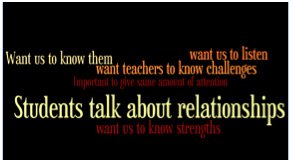New Teacher Academy: Building Relationships
How people skills lead to student success
Your content has been saved!
Go to My Saved Content.Welcome to the fifth and final week of Edutopia's New Teacher Academy blog series! I'm excited to be here with you sharing my passion to support and mentor new teachers. It's been great to have had the opportunity to provide resources for new teachers in five key areas. As we wrap up our series, we will continue to collaborate on these five topics in more detail on New Teacher chat, my weekly chat on Twitter, and also at my blog Teaching with Soul.
Please view this video as I share a few words on our focus for this last week.
Today's guest contributor is Joan Young, an elementary teacher/academic coach with a passion for building efficacy in kids. Author of 25 Super Sight Word Songs & Mini-Books published by Scholastic, Joan is an experienced educator with many years in the field. She'll share with us the importance of building relationships in the life of a new teacher.
Joan Young (@flourishingkids on Twitter) is an elementary teacher, academic coach and author. She co-moderates #ntchat and #elemchat, and blogs at All Kids Can Flourish.
Building Relationships with Joan Young

When I first began teaching, I encountered many complex situations with no easy answers. Curriculum teacher's editions certainly did not provide solutions to issues of teaching in a low performing school where many teachers had long ago burned out. I learned quickly that the one factor I could control was how I interacted with others to develop relationships that led to student success.
Below are a few tips to get you started working on building relationships...
1) Put Your Own Oxygen Mask on First!
Don't burn out by spreading yourself too thin. Before that "yes" flies out of your mouth when a colleague or administrator asks for a favor, evaluate the situation. Ask when they need an answer, and determine whether you can take on the task. Set reasonable deadlines and prioritize your "must-do's." I use Evernote and my Google calendar to prioritize and track daily tasks. Eat healthy, exercise, and take care of you! Just like that old saying, "You can't love someone else until you love yourself first," you can't be present for your students if you neglect yourself.
2) Trust is the Key to Relationships
Be consistent, reliable and careful to promise only what you can deliver. Let students know that you are available to meet or that they can send you email anytime. When students know you are on their side, they will take the risks and make the mistakes that lead to true learning.
3) Sense of Humor is Key
When we share funny stories and jokes, we form deeper bonds with others. With my students and colleagues, I often poke fun at my mistakes, creating a model of not taking myself too seriously. I also share brief uplifting, humorous stories and videos in class and through email, encouraging others to be playful as well.
4) Reflect, Don't React
Often we feel urgency in responding to issues that others perceive as a crisis. Take time to reflect and get support when you feel angry or upset. Respond to email in a timely manner; few situations require immediate response. Be careful that you discuss sensitive issues in person, as a lot can be misunderstood through email.
5) Use Your Network
Reach out to a support network of colleagues both at your school site and online. Use Twitter and chats like the New Teacher chat to build a network. Be selective with whom you interact at school. Negativity is contagious, but positivity can be too!
6) Speak Up
Don't be afraid to say what you need when talking with your administrator. It's taken me years to learn that I can gain more effective support when I frame the discussion by stating what type of response I need: "Please listen, because I just need to say this." Sometimes I might say, "Please help me brainstorm solutions. Here is what I have so far." If I bring ideas to my principal, we often reach a mutually agreeable solution in a very short time frame. The following resources will help you to continue to work on building relationships.We hope these tips on building relationships have been supportive to you! We'd also love to hear your thoughts on how you work daily to build relationships. Tell us about what works for you. How have these relationships supported you? If you have questions along the way, share them in our New Teacher Connection group or Tweet them using the hashtag #ntchat, and we will get back to you. Be sure to also join us tomorrow for New Teacher Chat at 5pt/8et. Our topic will be... how to build relationships. Hope to see you there!